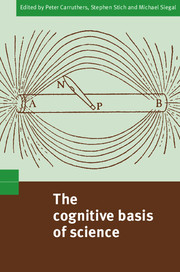Book contents
- Frontmatter
- Contents
- List of contributors
- Preface
- 1 Introduction: what makes science possible?
- Part one Science and innateness
- Part two Science and cognition
- Part three Science and motivation
- 12 The passionate scientist: emotion in scientific cognition
- 13 Emotions and epistemic evaluations
- 14 Social psychology and the theory of science
- Part four Science and the social
- References
- Author index
- Subject index
14 - Social psychology and the theory of science
Published online by Cambridge University Press: 23 November 2009
- Frontmatter
- Contents
- List of contributors
- Preface
- 1 Introduction: what makes science possible?
- Part one Science and innateness
- Part two Science and cognition
- Part three Science and motivation
- 12 The passionate scientist: emotion in scientific cognition
- 13 Emotions and epistemic evaluations
- 14 Social psychology and the theory of science
- Part four Science and the social
- References
- Author index
- Subject index
Summary
Evolutionary studies of animal behaviour have benefited enormously from the integration of mathematical models and field data. I suggest that the same harmonious combination could transform our theorizing about science. To support this, I try to show how simple models can illuminate various aspects of scientific practice, and also how such models need to rest on empirical psychological and sociological studies. As an illustration of the possibilities and the problems, I consider the issue of public involvement in scientific decision making.
An analogy
Between the 1950s and the 1970s, the integration of mathematical models and field research transformed earlier ventures in natural history into a sophisticated branch of ecology. Recognizing that natural selection affects the morphology, distribution and behaviour of organisms, mathematically inclined biologists formulated hypotheses about the expected characteristics of plants and animals by devising rigorous models about the constraints on, and optimal forms of, organismal phenotypes. Their endeavours drew on the observations of generations of field naturalists and, in turn, their results supplied concepts and hypotheses that a new cohort of observers could take into the field. At its best, the joint activity of mathematical theorizing and painstaking observation proved extraordinarily fruitful. So, for example, in Geoffrey Parker's extended study of the behaviour of dung-flies, precise expectations about the times spent foraging, searching for mates and in copula, have been formulated, tested and refined in an ever-more penetrating and detailed understanding of the natural phenomena (see, for example, Parker, 1978, and the discussion of this work in Kitcher, 1985).
- Type
- Chapter
- Information
- The Cognitive Basis of Science , pp. 263 - 282Publisher: Cambridge University PressPrint publication year: 2002



